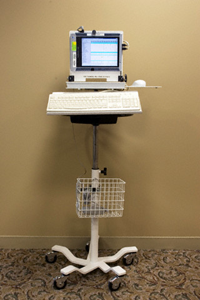
Nursing 3190: RN Access
Introduction to Nursing Informatics
Overview
The potential for Nursing Informatics to enhance nursing practice, study clinical problem-solving and ultimately improve the quality of care has been a long-standing expectation (Peterson & Gerden-Jelger, 1988). However, unlike many other information intensive industries, health care has been slow in adopting information technology. The U.S. National Advisory Council notes nurses, like other health care professionals, have yet to develop a culture "to promote acceptance and use of information technologies as basic tools for information management and exchange.”
- (D. Proctor, 1995, p. 305).
 Nursing Informatics (NI) is the application of computer science and information science to nursing. NI promotes the generation, management and processing of relevant data in order to use information and develop knowledge that supports nursing in all practice domains. Nursing Informatics (NI) is the application of computer science and information science to nursing. NI promotes the generation, management and processing of relevant data in order to use information and develop knowledge that supports nursing in all practice domains.
Across the globe, nursing leaders and educators have recognized the need for all nurses to participate in Nursing Informatics. Nurses need to develop the know-how to use information and communications technologies in the collection of data, use of information and generation of knowledge to support nursing practice.
"Nurses, in all domains of practice and at all levels, must be "technology literate" to be able to participate in decision making and evaluation of these systems - systems that should support them in information management, knowledge development and evaluation of new ways of practicing....Evidence-based practice in all practice domains requires competencies in informatics." (Hebert, 1999).
 The study of nursing informatics has been pursued by particular nurses since the late 1970s. It was long assumed that only some interested nurses would specialize in this new technologically based area of nursing. Now, in the 21st century, nursing leaders and policy makers are realizing that all nurses need at least a rudimentary level of competence in both nursing theory and skills in this evolving science. We have not seen the technological breakthroughs anticipated for the year 2000, predicted decades ago by nursing informatics pioneers. This is due largely to the overwhelming apathy or resistance from practicing nurses and middle management. If nursing is to keep control of it's own data, knowledge and information - nurses must become fluent in the language of the science, at least to a certain degree. Otherwise system analysts or more informatics savvy health care professionals will take control since we as a profession won't or can't. The study of nursing informatics has been pursued by particular nurses since the late 1970s. It was long assumed that only some interested nurses would specialize in this new technologically based area of nursing. Now, in the 21st century, nursing leaders and policy makers are realizing that all nurses need at least a rudimentary level of competence in both nursing theory and skills in this evolving science. We have not seen the technological breakthroughs anticipated for the year 2000, predicted decades ago by nursing informatics pioneers. This is due largely to the overwhelming apathy or resistance from practicing nurses and middle management. If nursing is to keep control of it's own data, knowledge and information - nurses must become fluent in the language of the science, at least to a certain degree. Otherwise system analysts or more informatics savvy health care professionals will take control since we as a profession won't or can't. The Canadian Nurses Association (CNA) in conjunction with the Canadian Association of University Schools of Nursing (CAUSN), Registered Nurses Association of British Columbia (RNABC), Academy of Canadian Executive Nurses, and the Nursing Informatics Special Interest Group of COACH has developed a working group to examine nursing education needs in informatics for all Canadian nursing students and practicing nurses, educators, managers and researchers. The intent is to develop a national strategy for addressing nursing informatics education.
 This Working Group had the goals to: This Working Group had the goals to:
- establish a national definition of Nursing Informatics
- propose core competencies for Canadian nurses
- identify Nursing Informatics education opportunities currently available to Canadian nurses; and
determine Nursing Informatics education priorities
In 2001, the Canadian Nursing Informatics Association was formed.
The mission of the CNIA is to be the voice for Nursing Informatics in Canada. Recognizing the importance of the work the CNIA is undertaking, the Canadian Nurses Association has granted emerging group status to the CNIA. In 2003, the CNIA was granted affiliate status by the CNA. The CNIA is also affiliated with COACH, Canada's National Health Informatics Association. Through this strategic alliance CNIA is the Canadian nursing nominee to the International Medical Informatics Association - Special Interest Group in Nursing Informatics (IMIA-SIGNI). In 2002 - 2003, the CNIA conducted a study, Educating Tomorrow's Nurses: Where is Nursing Informatics?.
 Recognizing the seriousness of this situation, the Canadian Nurse's Association and the CRNBC fully support that all Canadian nurses must develop informatics awareness and competencies. Soon, it will be a legislated directive that all nursing schools must offer informatics training to Canadian nursing students. Efforts will also be made to help practicing RNs develop these skills as well. At present, practicing nurses are expected to develop these skills on their own. But, in time, continuing education and professional development initiatives will be created to help all Canadian nurses work with computers in a confident and effective way. Recognizing the seriousness of this situation, the Canadian Nurse's Association and the CRNBC fully support that all Canadian nurses must develop informatics awareness and competencies. Soon, it will be a legislated directive that all nursing schools must offer informatics training to Canadian nursing students. Efforts will also be made to help practicing RNs develop these skills as well. At present, practicing nurses are expected to develop these skills on their own. But, in time, continuing education and professional development initiatives will be created to help all Canadian nurses work with computers in a confident and effective way.
Ends in View
This learning activity is intended to give the learner the opportunity to:
1. Gain awareness of the importance of nursing informatics in nursing education, research, administration and practice.
2. Examine their own level of comfort in using computers and computer programs.
3. Analyze their own level of skill and knowledge in using computers and computer programs.
4. Create a personal learning plan to develop computer program skills and knowledge.
In Preparation
1. READ: Hebert, M. (1999). National Nursing Informatics Project Discussion Paper Ottawa: CNA
2. READ: CNA. (2001). What is Nursing Informatics and why is it so important? Canadian Nurses Association Bulletin: Nursing Now, Number 11, September.
3. BROWSE: CNIA. (2003). Educating Tomorrow's Nurses: Where is Nursing Informatics?. Available online at http://www.cnia.ca/OHIHfinaltoc.htm
In Practice
1. EXPLORE: the Nursing Informatics Competencies: Self - Assessment area of this site (you can also access by clicking on Assess above or Self Assessment to the left) Be sure to complete the P.A.T.C.H. Assessment Scale, the Pretest for Attitudes Toward Computers in Healthcare, available either online or as a downloadable document. Reflect on your score and its' implications for cyberphobia and your ability to feel comfortable using computers in both education and practice.
2. Complete the Personal Plan which will help you to further
assess your comfort level with different computer applications programs (such as wordprocessing, spreadsheets, databases, web design, email, web browsers, etc.)
3. Review the Learning Activities developed for Semesters One through Five. There is a wealth of informatics related information, theory, and skill development in these activities.
4.CONSIDER: various ways that computer programs can help you complete your degree. Can these skills be used at work as well?
5. CONSIDER the computer system that exists in your current workplace. If one exists, what is your level of comfort and expertise in using it? If one does not exist, how would a computerized system assist you in your responsibilities and provision of care?
In Reflection
1. What steps do you need to take to feel knowledgeable and skilled in working with nursing informatics?
2. Consider how computers facilitate nurses in practice. Do you see any drawbacks?
References
- Canadian Nursing Informatics Association. (2002). Mission Statement. Online: http://www.cnia.ca
- Canadian Nursing Informatics Association. (2003) Educating Tomorrow's Nurses: Where is Nursing Informatics?. Online: http://www.cnia.ca/OHIHfinaltoc.htm
- CNA. (2001). What is Nursing Informatics and why is it so important? Canadian Nurses Association Bulletin: Nursing Now, Number 11, September.
- Herbert, C. (1999). Nurses and Informatics. National Nursing Informatics Project Discussion Paper Ottawa: Canadian Nurses Association.
NEXT: SEMESTER 6 NURSING INFORMATICS LEARNING ACTIVITY.... . .
|